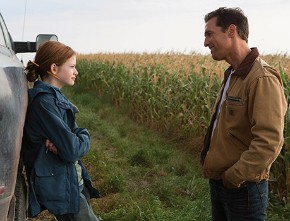Cosmic questions

Perhaps science fiction movies are always theological movies in disguise. The question “Are we alone in the universe?” sounds big, ponderous, and existential. But if we discover life on other planets, as a friend of mine opines, “We’ll just be alone with the Martians.” “Are we alone in the universe?” is always a question about God’s existence.
Interstellar shows this clearly. It’s a big, ponderous, self-important movie by Christopher Nolan, creator of the latest Batman films. While it falls short of its outsized ambitions, the movie still satisfies. And it does so by raising the question of a very modern god: technology. Modernity is marked by a trust that technology will allow us to master our universe and outlive mortal challenges. This film nearly jettisons this cheerful faith.
Read our latest issue or browse back issues.
In the not too distant future, environmental ruin has made Earth nearly uninhabitable. The whole planet is one big dust bowl. Most crops won’t grow and the few that do are primed for blight. But NASA, or what is left of it, is on the case, secretly building a spacecraft to either transport human life off the planet or transplant fertilized eggs to some more livable locale. Here is modernist faith throwing one last Hail Mary pass. Did I mention that NASA calls this the Lazarus Project?
The movie focuses on the relationship between Cooper (Matthew McConaughey) and his daughter Murphy (Mackenzie Foy and Jessica Chastain). As a child, Murphy idolizes her father for his farming and flying skills and learns all the science she can from this former astronaut. When he heads out on a space venture that may save the planet, his ship is unable to broadcast messages home for decades (relativity means hours for him but years for her). Yet Murphy continues to send messages into empty space in hopes that he’s still listening. The movie touches on the deepest fear of every child and every parent: abandonment and failure, respectively. Cooper is off to save the human race, but Murphy is hurt and angry at being abandoned.
Despite its modernist leanings, the movie has a touch of the supernatural in it. In ten-year-old Murphy’s bedroom, books fall without explanation. The dust swirling into her room arranges itself into patterns. Father and daughter realize that these patterns reveal coordinates. They discover NASA’s secret building site, and NASA discovers Cooper as a candidate to fly its mission. It’s a little too metaphysically tidy.
The film is filled with stock memes, most notably the rural Iowa-like hometown of Cooper and family. Most astronauts probably live in places like suburban Huntsville, Cape Canaveral, or Houston, but we Americans seem to want our saviors to be surrounded by ears of corn and white frame houses that need a paint job. Somehow McConaughey’s Texas accent and Iowa’s endless fields are made to go together. But just because you say things wistfully, looking off into the distance, doesn’t make them deep—see Jim Carrey’s parody of McConaughey on Saturday Night Live.
Often the film manages to break past stereotypes. Its imagery of a tiny little speck of a lifeboat ship against the grandeur of Saturn and its rings will stay with me forever. Computer-generated imagery of a black hole is both beautiful and frightening. At one point on the voyage, the astronauts bump into Dr. Mann (Matt Damon), another astronaut, but one who has opted to fight for his own survival rather than that of his fellow humans: “Don’t judge me,” he says. “You haven’t been through what I have.” His life-and-death wrestling match with Cooper recalls Cain and Abel. In the end these scientists are making decisions that affect our whole species on the basis of nothing stronger than human love and hate.
By the end of the movie the humans realize that they’re not alone with Martians or other saviors; they’re alone with themselves. But the same god they’ve trusted in the past becomes available to them again. We viewers are to leave the theater hopeful: sure, they might have ruined this planet. But they’ll hustle up a fix for this problem at some point, with some amazing new gizmo. Take heart, ye of little faith.






